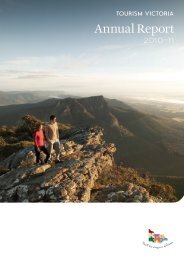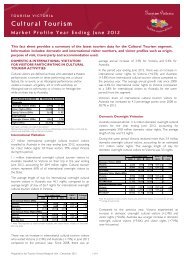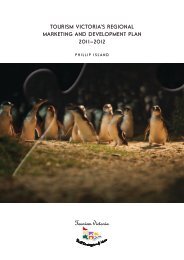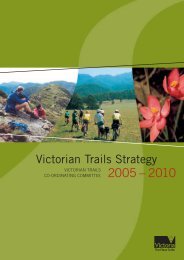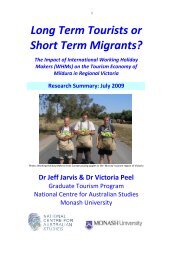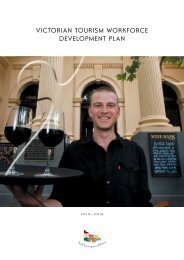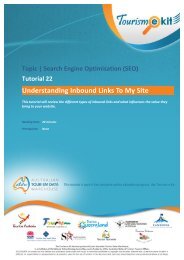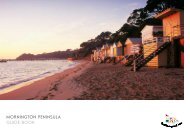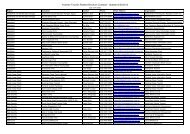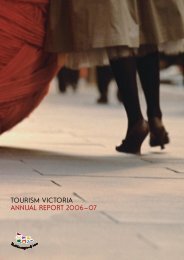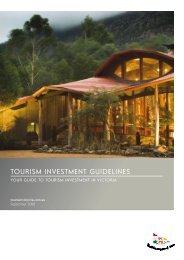Crisis Communications Handbook for Regional ... - Tourism Victoria
Crisis Communications Handbook for Regional ... - Tourism Victoria
Crisis Communications Handbook for Regional ... - Tourism Victoria
You also want an ePaper? Increase the reach of your titles
YUMPU automatically turns print PDFs into web optimized ePapers that Google loves.
Week Two<br />
Weather conditions are mild and sunny and the bloom has spread rapidly (it is suspected because of the<br />
high-level input of nutrients during the flood) and now spreads from Wattle Point in the west to Lakes<br />
Entrance in the east.<br />
This represents one of the most severe and widespread blue green algae outbreaks experienced in the<br />
Gippsland Lakes. DHS extends its bans on the harvest and consumption of mussels and prawns to several<br />
areas as well as 10km out to sea from Lakes Entrance.<br />
Local media is careful not to over-dramatise the situation and reports responsibly on which areas have been<br />
affected and the early impacts on local businesses, as well as highlighting the safety of other recreational activities<br />
in the region.<br />
The metropolitan media pick up the story and un<strong>for</strong>tunately concentrate on the negatives with television news<br />
using archival footage to illustrate a bloom in the area and the newspapers running articles headlined: ‘An<br />
environmental catastrophe’ and ‘Lakes choking to death’.<br />
Tourist operators and accommodation providers start to report widespread cancellation of bookings.<br />
Response<br />
The TRRG is meeting three times a week to actively address the negative impacts of the worsening situation<br />
caused by both the algal bloom and media coverage.<br />
Unlike many disasters or incidents that might occur in an instant – leaving a region’s tourism sector coping with<br />
the consequences - a blue green algal bloom normally presents an evolving issue, the ongoing nature of which<br />
will frustrate ef<strong>for</strong>ts to move on into a recovery phase.<br />
As a result, the TRRG’s initial focus is placed on ensuring visitors are kept safe and that they, along with<br />
potential visitors, are aware that the region remains ‘open <strong>for</strong> business’ with a range of recreational opportunities<br />
still available.<br />
The TRRG also coordinates the dissemination of up-to-date in<strong>for</strong>mation to key stakeholders to ensure that<br />
they are aware of the unfolding situation.<br />
Ongoing actions of the TRRG include:<br />
• The faxing of an Urgent In<strong>for</strong>mation Request to all tourism operators and accommodation providers in<br />
the region to assess impacts<br />
• Daily contact with the Incident Control Team <strong>for</strong> latest details, including the expected extent and duration<br />
of the bloom<br />
• The faxing of regular internal updates (as required) on the situation to all tourism operators and<br />
accommodation providers in the region<br />
CRISIS COMMUNICATIONS HANDBOOK FOR REGIONAL AND LOCAL TOURISM 57




